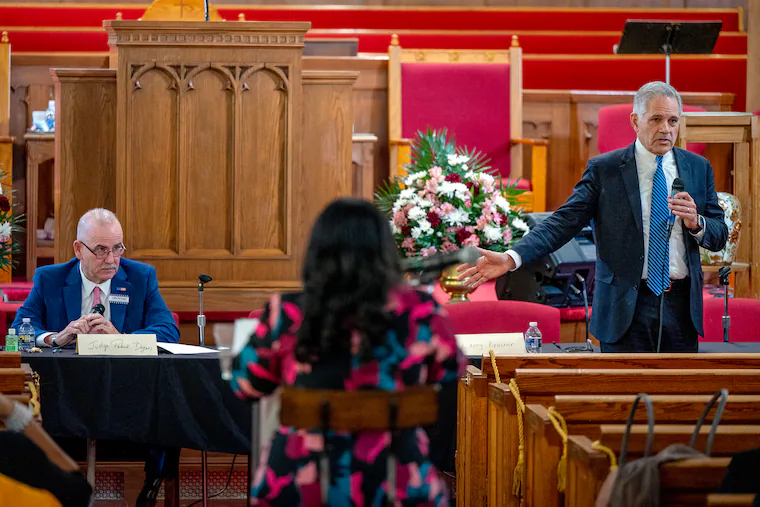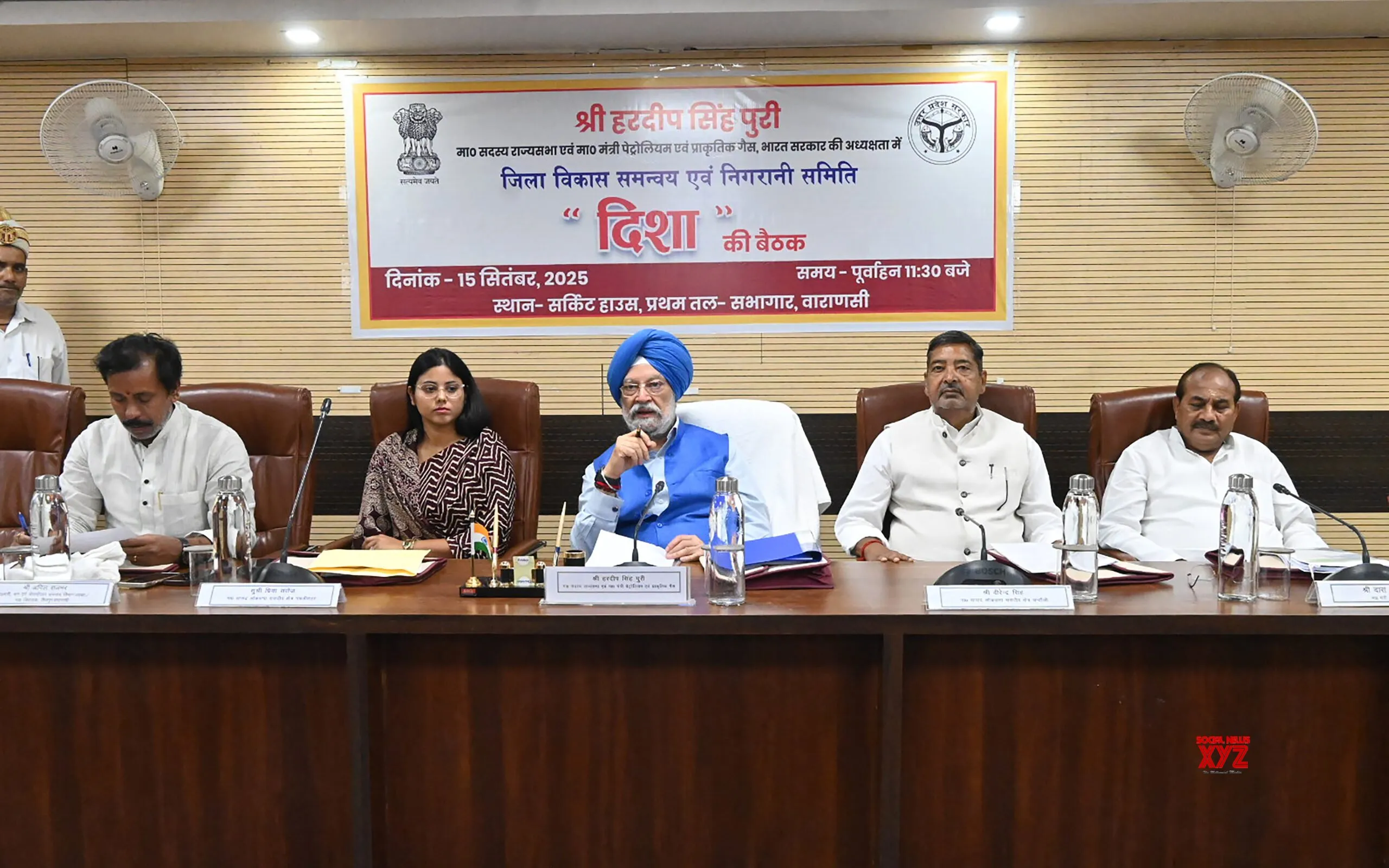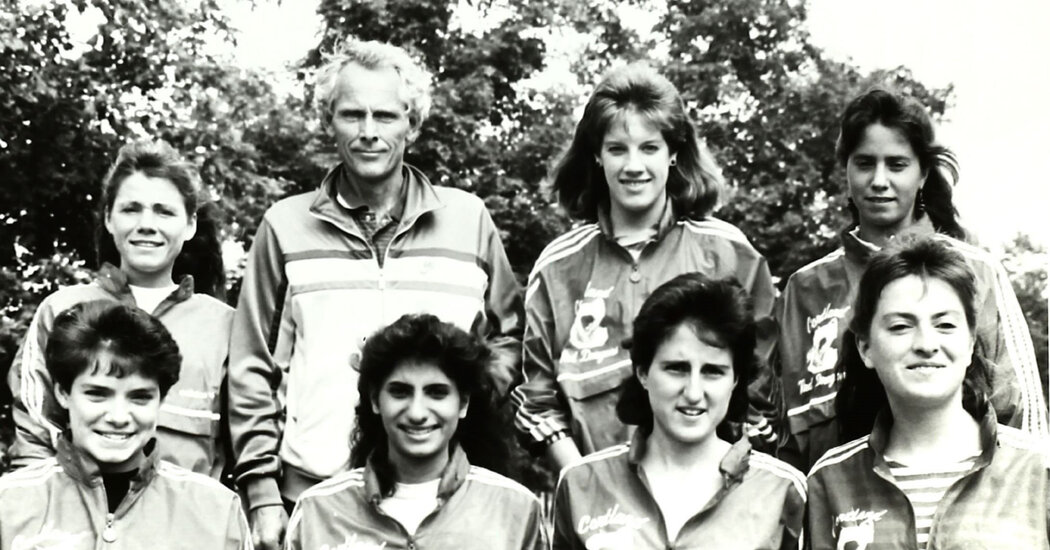What the general election campaigns against Larry Krasner and Zohran Mamdani say about the Democratic Party

Former Municipal Court Judge Patrick Dugan’s decision to make a second attempt at unseating District Attorney Larry Krasner this year — by running as a Republican in the November general election after losing to Krasner in the Democratic primary — has no precedent in recent Philadelphia politics.
But it appears to be part of a recent trend of centrist and establishment Democrats using general elections to try to defeat more progressive candidates chosen by their own party’s primary voters.
And in some cases, the strategy has proven successful.
In 2021, then-Buffalo, N.Y., Mayor Byron Brown lost in the Democratic primary to challenger India Walton, a Democratic Socialists of America member. But Byron won reelection by defeating Walton in the general election while running as a write-in candidate.
In 2023, incumbent Allegheny County District Attorney Stephen Zappala lost in the Democratic primary to the more left-leaning Matt Dugan, who is not related to Patrick Dugan. But Zappala came back and won in the general election while running as the GOP nominee after local Republicans organized a primary write-in campaign for him —providing the blueprint for Philly Republicans’ efforts to boost Patrick Dugan this year.
And this year, Zohran Mamdani’s shocking win in the Democratic primary for New York City mayor has prompted two prominent Democrats — former Gov. Andrew Cuomo and incumbent Mayor Eric Adams, who did not run in the primary — to run as independents in the general election against the self-described democratic socialist.
On the other side of the aisle, there are few recent examples of Republicans in the region going to similar lengths to defeat their party’s nominees, setting aside elections where candidates are allowed to file to run in both parties such as some Pennsylvania judicial and school board races.
So why do some centrist Democrats appear more comfortable challenging the preferences of their own party’s primary voters than Republicans do?
Alison Dagnes, a political science at Shippensburg University who has written books on political polarization and the media landscape, said the GOP side of the equation is clear: Republican primaries have become contests to prove which candidate is most aligned with President Donald Trump, and the party’s old guard has given up trying to roll back the MAGA tide.
“The Republican Party right now is not really operating as a political party,” Dagnes said. “They have eschewed policy disagreements in favor of fealty to Trump and MAGA, and as a result they operate more as a supportive coalition around a singular figure.”
Understanding why some moderate Democrats are willing try to defeat their party’s nominees is less straightforward, experts said.
According to Dagnes, one factor is the party’s well-documented struggles with finding a unified identity in the Trump era, with many establishment Democrats backing a big-tent centrism while progressives push for a left-leaning populism to compete with Trump’s MAGA movement.
“Democrats are in the wilderness,” she said. “When the party out of power is trying to find their way back, then there are a hundred ideas about the best way to do that, and the problem is there really is not a one-size-fits-all solution for the Democrats now.”
Daniel J. Hopkins, a University of Pennsylvania political scientist, said that one reason for the trend may have less to do with politics than with the nature of local elections.
In municipal races, candidates and voters alike may place greater weight on perceptions about competence and service delivery than on ideology and partisanship, Hopkins said. And because Democrats happen to dominate the highest-profile local offices in the country — big city mayors and district attorney positions — these types of conflicts are more likely to arise for Democrats than Republicans.
“It’s probably more of a city phenomenon,” said Hopkins, cautioning that there isn’t enough scholarship on the issue to give a definitive answer. “National party competition doesn’t map well into the kinds of local issues that may come up in, say, the Dugan-versus-Krasner race, and it’s not shocking then, given that our election laws have privileged these two political parties, which are defined based on their national labels, that local candidates with some level of local name recognition wind up shifting to another party’s line.”
‘Silent majority’
When no Republican filed to run for district attorney this year, the Philly GOP in May organized a write-in campaign to nominate Dugan so that he could run in the general should he come up short in the primary to Krasner, a leader of the national progressive prosecutor movement who is seeking a third term and has become the chief bogeyman for local conservatives.
» READ MORE: How Larry Krasner won Philadelphia’s district attorney primary — again
Dugan, an Army veteran, campaigned in the primary as a tougher-on-crime alternative to Krasner. During the primary, Dugan’s then-campaign manager said that he wouldn’t accept the GOP nomination if offered. But the ex-judge reversed course in August to give “a second chance for the citizens of Philadelphia to get it right,” he said in an interview Monday.
A self-described “lifelong Democrat,” Dugan explained that he felt comfortable challenging Democratic primary voters’ wishes given the extremely low turnout in the May election.
“It seems like the people who have the most vocal opinions come out and the silent majority stay home in the primaries,” Dugan said. “My feeling from talking to Philadelphians is that they are fed up with the far-left policies of the Democratic Party, in particular what Larry Krasner’s been doing.”
» READ MORE: Low voter turnout in the primary election is a warning sign to some Philly Democrats
Given Krasner’s 29-percentage point victory in the primary and Democrats’ more than 6-to-1 voter registration advantage in the city, Dugan is undoubtedly facing an uphill battle running as a Republican in the general election.
Krasner said the willingness of moderate Democrats like Dugan to buck their own voters reflects the party’s inability to understand that Americans across the political spectrum are looking for politicians who will break the mold, noting that many voters in national polls have expressed positive views about Barack Obama, Bernie Sanders, and Trump.
“The voters seem to have no problem figuring this out, and they’re obviously drawn on both sides to people they view as outsiders,” Krasner, a former defense attorney, said. “I would hope that‘s a lesson to insiders in both parties.”
Krasner criticized Dugan’s willingness to work with Republicans at a time when Trump “is out to destroy the government of the United States and bring about a military dictatorship or a monarchy.”
During the primary, Krasner often sought to tie Dugan to Trump, and he’s doubling down on that strategy now that the latter is running as the GOP nominee. Krasner’s office held a series of neighborhood town halls last week on the potential of Trump sending the National Guard to Philadelphia.
“We who are real Democrats need to dig in,” Krasner said. “We need to fight this every step of the way. We cannot have a world where fake Democrats reemerge as Republican candidates.”
‘At war with itself’
Centrist Democrats’ distrust of some of the party’s own primary voters is “part of the reason the Democratic Party’s brand is in the dumps right now,” said Nick Gavio, a spokesperson for the Working Families Party, a progressive group that has backed Krasner and other anti-establishment candidates on the left in New York and Pennsylvania.
“The reason Larry Krasner won is because the people like his policies,“ Gavio said, pointing to Krasner’s embrace of criminal justice reform and his attacks on Trump. “What moderates who are running in the general election are basically saying to the Democratic base is: We don’t support these policies that you support.”
Although Dugan is hoping to win over centrist Democratic voters, he hasn’t yet succeeded in doing so at the institutional level, despite a recent history of the local party establishment being at odds with Philly’s progressive movement. The Democratic City Committee, which is usually no friend to Krasner, immediately condemned Dugan’s general election campaign after he accepted the GOP nod, and Ryan Boyer, leader of the politically powerful building trades unions, has also criticized Dugan’s second run.
» READ MORE: Philly’s building trades unions have turned against Pat Dugan as he runs against DA Larry Krasner as a Republican
Christopher Nicholas, a Pennsylvania GOP political consultant, said the Philadelphia district attorney race is the latest example of Democrats’ failing to articulate a clear governing philosophy in big cities.
“The Democratic Party is at war with itself over the best way to administer the large urban areas that it’s long controlled,” Nicholas said.
Nicholas also noted that research has shown that primary voters in both parties are now more likely to have ideologically polarized views compared to the average voter than they were in the past — meaning a moderate like Dugan may see a more viable path in November.
“The challenge for Mr. Dugan,” Nicholas said, “is how do you get some Democrats who didn’t vote for you in the primary to vote for you in the general?”



